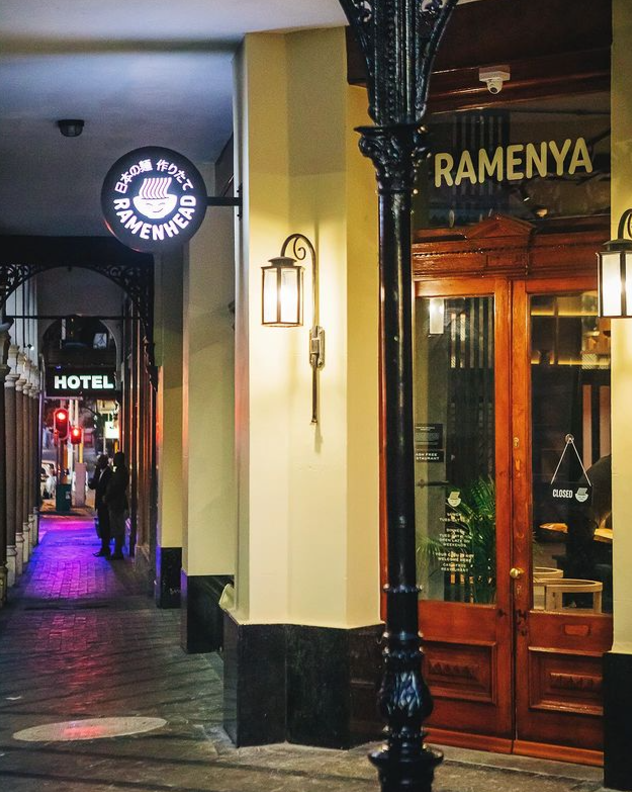Chefs Peter Tempelhoff and Ashley Moss’s edgy ramen house is offering the very best of Japan’s popular street food, with premium sakés creating the ideal pairing.
It’s all about good noodles and sophisticated sipping at Cape Town’s Ramenhead. The FYN Group’s casual eatery, Ramenhead, continues to dish up its take on the popular Japanese noodle bowls and is set to launch its latest menu, specifically designed for summer enjoyment and bringing exciting new offerings. As the season approaches, the team has also expanded their extensive saké selection— well suited for sipping while you slurp your noodles.
Ramen | The Perfect Noodle
When it comes to ramen, shaping the perfect noodle is no small feat – and at Ramenhead, there’s no cutting corners. The restaurant boasts the first Yamato Noodle Machine on the continent, a machine expertly designed in Japan to produce high-protein, low-hydration noodles that deliver the required springy texture and mouthfeel. Once made, the noodles are allowed to rest for 2–5 days to develop their gluten structure, maturing through fermentation to achieve the correct texture and develop the resilience to withstand the heat of cooking.
“A good bowl is about balance and how the components complement each other. With the noodles it’s about their relationship to the soup. Chefs use the flavour, texture, substance and thickness of the noodles to provide the ultimate slurp for a given style of broth. There is no set rule for what noodles go with a particular soup – however there is a trend in certain prefectures of Japan to favour a certain style of noodle. For example, in Hakata thick tonkotsu is served with thin straight noodles, while in Tokyo there has been a recent trend towards thick curly noodles in light shoyu bowls. It’s important to us that we not only create a delicious bowl, but also respect the rich and layered history behind each ramen style,” explains Chef Ashley Moss.
This precise Japanese machinery and the multi-day preparation process allow the chefs to recreate an impressive range of ramen styles, replicating those from the regions where particular bowls originated. The current menu includes a tonkotsu from Fukuoka using thin Hakata-style noodles, while also featuring a miso tonkotsu from Sapporo which uses a thicker, wavy noodle.
The noodles are accompanied by umami-rich, slow-simmered broths—some of which take up to 16 hours to cook—developing rich, complex layers of flavour. The noodles are then topped with the finest quality ingredients, such as pork belly chashu, ajitamago (marinated egg), pickled ginger, and mayu and rayu oil for the classic tonkotsu bowl, or yuzu and garlic prawns, enhanced by a prawn shell emulsion and seaweed salad, for the ebi abura soba.
Saké | The Sacred Sip
Since its opening, Ramenhead has always boasted a strong saké offering, but it has now been elevated after the FYN Group decided to import saké independently. This decision was made after a journey to Kanazawa, Japan, where FYN chefs Peter Tempelhoff and Ashley Moss, together with service and beverage director Jennifer Hugé, visited the historic Fukumitsuya Saké Brewery—the oldest saké brewery in the city, renowned for producing some of Japan’s finest saké.
The brewery, established in 1625, uses only two ingredients: high-quality saké rice from contracted farmers and “Hyakunensui,” which means one-hundred-year-old water. This water begins as rain and snow at the foot of Mt. Hakusan and is believed to take at least 100 years to filter through the mountain’s ancient stones and soil before reaching the brewery’s well, where it is then used to make this exceptional rice wine.
Combining these two simple but spectacular ingredients with exceptional craftsmanship and a traditional family secret recipe, it is no wonder Fukumitsuya produces some of the finest saké in Japan. This quality inspired the FYN Group’s decision to offer it at their restaurants.
The importation process was arduous, involving navigation through challenging regulations, but over a year later, the first delivery of Fukumitsuya saké arrived in Cape Town. It is now a cherished addition to the FYN Group’s offerings, available for diners to sip and savour across their restaurants—including Ramenhead.
Saké pairs particularly well with ramen, thanks to its delicate flavours, lower acidity, and smooth, aromatic qualities. Jennifer suggests pairing savoury sakés with ramens featuring more complex broths, while the lighter, fruitier styles pair best with lighter broths.
She suggests pairing a rich ramen such as a tonkotsu with a more full-bodied saké like the Junmai Ginjo Hyo Hyo, and the lighter tori chintan bowl with something clean and vibrant such as a sparkling saké, although diners are encouraged to indulge in a range of sakés to find the style they enjoy most.
Trying something new can always be somewhat daunting, so Ramenhead’s skilled team is on hand to guide diners through the various options and find the one best suited to their tastes. For November, they’re offering a complimentary tasting glass of saké to accompany your meal—an excellent way to begin your saké journey. Simply ask, and they will deliver!
ALSO SEE: Queens Lounge: Where cocktail kings and queens folly
Feature image: Ramenhead/ Instagram

